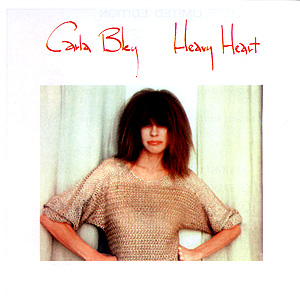|
|
|
01 |
Light Or Dark |
|
|
|
06:04 |
|
|
02 |
Talking Hearts |
|
|
|
06:49 |
|
|
03 |
Joyful Noise |
|
|
|
05:08 |
|
|
04 |
Ending It |
|
|
|
06:04 |
|
|
05 |
Starting Again |
|
|
|
05:04 |
|
|
06 |
Heavy Heart |
|
|
|
09:50 |
|
|
|
| Country |
USA |
| Cat. Number |
817864 |
| Spars |
DDD |
| Sound |
Stereo |
|
|
|
Label: Watt/14 (ECM 817 864-2)
Recording date: September, October 1983
Carla Bley - organ, synthesizer
Steve Slagle - flute, alto and baritone saxophone
Hiram Bullock - guitar
Gary Valente - trombone
Kenny Kirkland - piano
Steve Swallow - bass
Victor Lewis - drums
Manolo Badrena - percussion
Michael Mantler -trumpet
Earl McIntyre - tuba
Heavy Heart
Date of Release Sep 1983 - Oct 1983 (recording)
In a fanciful press release for this record, Carla Bley wrote that she wanted to make a record that would "put people in a mellow, sensual mood" as opposed to getting them all riled up as usual. She must have meant some of this ironically, for while Heavy Heart is a somewhat bright, light-minded album, there are plenty of dark undercurrents to be heard. For example, take the fascinating "Light or Dark," where a light, happy texture is undercut by Hiram Bullock's intruding dissonant guitar and Kenny Kirkland's discordant comping. Or the ominously titled "Ending It," with Gary Valente's abrasive trombone dominating everyone - or the dissonant, almost inaudible wind backings to Kirkland's big-hearted piano on "Starting Again." In any case, Bley's iconoclastic imagination and ear for unusual sonorities is definitely in gear writing for her ten-tet - and true to her word, a number like "Talking Hearts," an alleged romantic dialogue between Bullock's smooth guitar and Bley's sly synthesizer, is saunteringly attractive stuff. - Richard S. Ginell
From Calyx (!)
Carla Bley
American pianist/composer Carla Bley (nee Borg) was born in Oakland, California (USA) on May 11th 1938. As a child and teenager, she taught herself the piano and subsequently became interested in jazz. Moving to New York City at age 19, she met pianist Paul Bley, later marrying him. She began composing for his group, and in subsequent years concentrated on that aspect of her work, although she briefly played in a band led by Charles Moffett featuring Pharoah Sanders. In 1964, she met Austrian trumpeter Michael Mantler in the Jazz Composers' Guild. Together, they started an orchestra made up of the Guild's members, including Roswell Rudd, Archie Shepp and Milford Graves. This later became the Jazz Composers' Orchestra. In 1965, she left Paul Bley and married Mantler.
Carla Bley's critical breakthrough came in 1967 with the album A Genuine Tong Funeral by the Gary Burton Quartet, which she had composed specifically for the group. Soon after, she was commissioned by Charlie Haden, an old friend from the California days, to arrange and contribute pieces to his album, Liberation Music Orchestra. Between other people's projects, she also started work on an opera, Escalator Over The Hill, a collaboration with the poet Paul Haines featuring a large cast of singers and players (including Jack Bruce, John McLaughlin, Linda Ronstadt, Don Cherry, Roswell Rudd, Charlie Haden and Gato Barbieri), which was finally completed in 1972, but never performed live until the Summer of 1998, when Bley assembled a new line-up for a series of festival appearances in Europe.
In 1973 Mantler and Bley formed their own label Watt Works and began to make their own records, starting with Bley's Tropic Appetites, another collaboration with Paul Haines, and a joint album, 13 & 3/4 for which they wrote one side each. In 1975, she formed a shortlived rock group with vocalist/bassist Jack Bruce, featuring guitarist Mick Taylor, but it split up after six months and a well-received tour. She decided to form her own band. In 1976, she recorded Dinner Music with members of the group Stuff, and had a first attempt at a live band at that year's Baden-Baden Free Jazz Meeting, leading a line-up that included Michael Mantler, Gary Windo, Hugh Hopper and Aldo Romano. Around that time, she also played on Michael Mantler's concept albums The Hapless Child (1976) and Silence (1977), both featuring Robert Wyatt on vocals.
In the Summer of 1977, she assembled the first Carla Bley Band, with Hopper, Elton Dean, Windo, John Clark, Bob Stewart, Andrew Cyrille and others. They recorded a studio album, titled European Tour 1977, but strangely enough recorded in the studio, before the actual three-week tour took place in the Autumn of 1977, playing jazz festivals around Europe. Unfortunately, Carla Bley's links with the Canterbury scene stopped at that point, but she has since kept touring and recording with her band, releasing the albums Musique Mecanique (1978), Social Studies (1980), Live! (1981), I Hate To Sing (1982), Heavy Heart (1983), Night-Glo (1985), Sextet (1987), Fleur Carnivore (1989), The Very Big Carla Bley Band (1991), Big Band Theory (1993) and The Carla Bley Big Bang Goes To Church (1996), as well as two duo albums with bassist Steve Swallow (with whom she has been living since splitting with Mantler in 1991), Duets (1988) and Go Together (1992), and another in trio with Swallow and saxophonist Andy Sheppard, Songs With Legs (1994). She has also composed, at Jack Bruce's request, a mini-opera entitled Under The Volcano, based on the novel by Malcolm Lowry, which was performed at 1985's New Music America Festival in Los Angeles.
